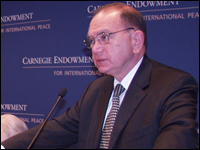Registration
You will receive an email confirming your registration.
IMGXYZ1037IMGZYXWhen the Obama administration assumes power, it will realize that it is facing an increasingly complicated Arab and Muslim world, where the struggle between moderate and extremist forces takes different shapes in each country. The U.S. should adopt a dual approach depending on the specific cultural and political situation in a given country: conflict resolution not conflict management, and political and economic reform promotion.
In a talk moderated by Ambassador James F. Collins, Ambassador Edward Djerejian offered recommendations to the new administration, accompanied by comments from Aaron David Miller and Marina Ottaway.
Recommendations:
Ambassador Djerejian argued that in order for the U.S. to successfully apply democracy promotion, it must learn to differentiate among the countries of the broader Middle East in terms of their political and social distinctiveness. The U.S. should adopt a dual approach: conflict resolution not conflict management, and political and economic reform promotion.
This is particularly relevant for the Arab-Israeli conflict, which should no longer be addressed through a peace process, but rather through the full employment of a conflict resolution policy. The road to Arab peace with Israel goes through Jerusalem, and not through an installed democratic regime in Baghdad. The only lacking element in moving forward is the political will on the U.S. side.
The real War on Terror is happening in Afghanistan and Pakistan, or the so called “cold room,” and the two countries are the most neglected items on the U.S. agenda. In order to avoid a new crisis in Kashmir and other calamities, the U.S. must address all conflicts in the region that impact each other directly under a more holistic policy.
Addressing the Arab-Israeli Conflict:
Aaron Miller argued that the United States cannot be an honest broker in a Middle Eastern peace deal because it has a special relationship with Israel. The U.S. is a partial mediator in the conflict, and it will fail if it allows its special interests to become exclusive. Reaching a conflict-ending agreement in the Palestinian-Israeli conflict is impossible. However, the U.S. has a very high chance of reaching a Syrian- Israeli peace deal.
Goodwill from the Middle East:
Marina Ottaway stated that the election of Barack Obama has gained the U.S. much goodwill from the Middle East in public diplomacy. However, the goodwill can fade at the same speed it was created, and the Middle East is likely to take a much more guarded position towards the U.S. This can already be seen in the reactions to some of the initial appointments in the Obama administration.
Although the basic battle in the Middle East and the Muslim world is indeed between the moderates and the radicals, the large center remains uncommitted. This is why the U.S. needs to be careful of having a too narrow definition for moderates.
Questions and Answers:
In the questions and answers session Ambassador Djerejian further addressed questions on the U.S. public diplomacy expectations from the Obama administration. There are no signs of China’s diplomatic involvement in peace efforts in the Middle East, however, China could play an important role. The Ambassador also acknowledged the challenges of working with autocratic regimes, and stressed the importance of supporting civil society.
